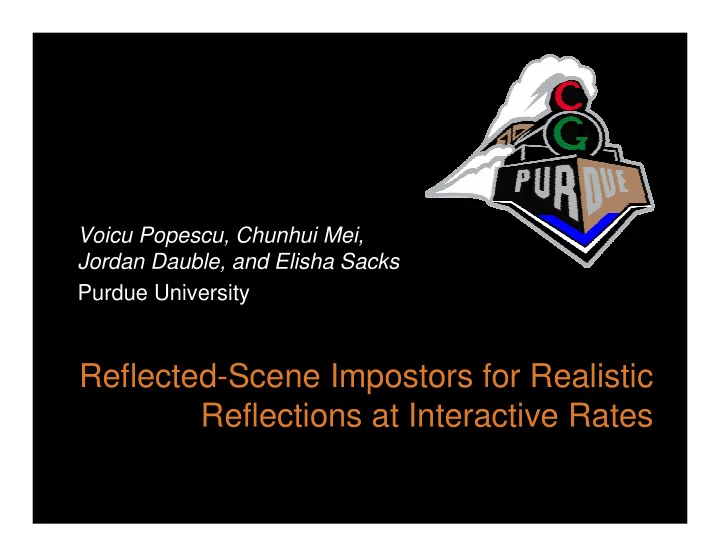

Voicu Popescu, Chunhui Mei, Jordan Dauble, and Elisha Sacks Purdue University Reflected-Scene Impostors for Realistic Reflections at Interactive Rates
Reflections—a difficult problem • Every reflector is a portal onto a world which is as rich as the directly observed scene and which has complex image formation laws 2
Prior work—vast Image-Based Ray tracing Rendering Feed-forward Approximation of reflection rendering reflected scene 3
Problem of rendering reflections • Compute – Intersection with reflector – Reflected ray – Intersection with reflected scene – antialiasing 4
Problem of rendering reflections • Compute – Intersection with reflector “OpenGL” – Reflected ray – Intersection with reflected scene ??? – antialiasing 5
Reflected-scene approximation • Reflected scene replaced with approx. that provides – Fast intersection with ray – Antialiasing 6
Reflected-scene approximation • Example: environment mapped reflections – Reflected scene infinitely far away – Straight forward intersection with ray – Antialiasing computed in 2D (mipmapping) 7
Reflected-scene approximation • Example: environment mapped reflections – Reflected scene infinitely far away – Straight forward intersection with ray – Antialiasing computed in 2D (mipmapping) – Drastic approximation, incorrect results close to the reflector 8
Our approach • Approximate reflected scene with impostors – Considerable prior work on impostors – Reflector surface prevents desired viewpoint from getting too close to the impostor – Reflection distortion hides impostor artifacts 9
Impostor requirements • Impostor has to provide – Fast construction – Fast intersection with ray – Antialiasing 10
Results: billboard impostors 11
Results: depth image impostors 12
Billboard impostors • Replace reflected object with billboard • Higher order reflections – Reflective billboards (normal mapped quads) 13
Billboard impostors • Impostor has to provide – Fast construction YES – Fast intersection with ray YES – Antialiasing YES 14
Pixel algorithm • For D diffuse, R reflective billboards, and maximum reflection order K – Compute reflected ray r – For reflection order 1 to K • Intersect with ( D + R -1) billboards • If no intersection – return EM(r) • Else if intersection with diffuse billboard DB i – return DB i (r) • Else if intersection with reflective billboard DB i – r = DB i (r) 15
Pixel algorithm • For D diffuse, R reflective billboards, and maximum reflection order K – Compute reflected ray r – For reflection order 1 to K • Intersect with ( D + R -1) billboards • If no intersection O(K*(D+R)) – return EM(r) • Else if intersection with diffuse billboard DB i – return DB i (r) • Else if intersection with reflective billboard DB i – r = DB i (r) 16
Example: 4 teapots • D = 1, R = 4, D+(R-1)+D = 5 intersections / pix • 12 second order reflections • 40fps 17
Example: table scene • D = 2, R = 2, D+(R-1)+D = 5 intersections / pix • 2 second order reflections • 33 fps 18
Example: table scene • D = 2, R = 2, D+(R-1)+D = 5 intersections / pix • 2 second order reflections • 33 fps 19
Example: table scene 20
Example: pushing-it scene • D = 2, R = 9, D+(R-1)+D = 11 intersections / pix • 72 second order reflections • 11 fps 21
Example: pushing-it scene • D = 2, R = 9, D+(R-1)+D = 11 intersections / pix • 72 second order reflections • 6 fps 22
Example: pushing-it scene 23
Problem Transition from impostor to environment map ( red in left image) is discontinuous. 24
Solution: ray morphing 25
Solution: ray morphing r e d -r a )h/H r m =r a +(r 1 d E r 1 r m r a a B R A r 1 q 0 r 0 q 1 26
Solution Left —continuous transition. Right —morph region ( green ), environment map ( red ). 27
Ray morphing 28
Attenuation w/ distance 29
Fresnel 30
Combined effects 31
Animation and materials 32
Comparison to env. mapping 33
Billboard limitations • No support for objects very close to the reflector • Limited accuracy – Flat reflection – Lack of motion parallax 34
Depth image impostors • Impostor has to provide – Fast construction YES – Fast intersection with ray ??? – Antialiasing YES 35
Depth image—ray intersection Epipolar-like constraints: intersection computed as 1D search Still too many steps along epipolar segment 36
Simplified Rotated Depth Maps Pre-rotate depth map. All rays ever needed project to rows. Pre-simplify rows. 37
Simplified Rotated Depth Maps 38
SRDM construction cost Number of 8 16 32 64 segments Construction 210 300 480 980 time [ms] Rigid body transformations, color updates, and reflector updates do not require reconstruction. 39
Depth image impostor results 40
Depth image impostor results 41
Depth image impostor results 42
Depth image impostor results 43
Depth image impostor results 44
Depth image impostor results 45
SRDM under-sampling One rotated depth map every 20 o , 10 o , 3 o , and 2 o , respectively. 46
Depth image impostor results 47
Conclusions • The reflected-impostor approach works – Fast, realistic – Increased modeling effort • Rendering reflections reduced to the lesser problem of rendering w/ impostors 48
Future work • Other types of impostors – occlusion-resistant 49
Future work • Other types of impostors • Other BRDFs • Self-reflections • Constructing the SRDMs on the GPU 50
Acknowledgments • Funding & equipment – NSF, Intel, Microsoft, Computer Science Purdue, Visualization Laboratory Purdue • Stanford 3D Scanning Rep. for models • Paul Debevec for environment maps • Our graphics group at Purdue for miscellaneous but important help 51
Recommend
More recommend